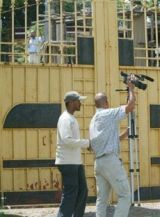Ethiopian opposition CUD chief confined to house
ADDIS ABABA, June 11 (AFP) — The leader of Ethiopia’s main opposition group said he was once again under virtual house arrest as authorities continued a crackdown after deadly violence during election protests this week.

|
|
A plainclothed security man prevents a journalist from filming the leader of the Coalition for Unity and Democracy Hailu Shawel as he stands behind a gate at his house, Saturday, June 11, 2005 in Addis Ababa. (AP). |
Hailu Shewal, chairman of the Coalition for Unity and Democracy (CUD), said he had been confined to his home in Addis Ababa by security forces amid reports that scores more of the group’s members had been arrested.
“Since this morning, I can’t go out,” he told AFP by telephone. “Nobody can come in. Now it is a proper closing of my house.”
Hailu had been restricted in his movements earlier this week after protests against alleged fraud in the May 15 polls sparked clashes with police in which at least 30 were killed but the curbs were eased after foreign intervention.
Tension outside his house was high on Saturday and police briefly confiscated cameras and equipment belonging to seven foreign journalists who were in the vicinity.
CUD vice-chairman Berhanu Nega said more of the group’s employees had been arrested Saturday on top of more than 50 who were in custody a day earlier and said the developments hurt already dim prospects for a Friday truce signed by the government and opposition.
“How can they expect us to implement this agreement when all of our people are in jail and are still being arrested?” he said.
Ethiopian authorities would not immediately confirm or deny the arrests but have defended the crackdown as necessary to preserve peace following clashes on Wednesday in which police opened fire on crowds.
Yerdaw Ashagari, the medical director at the Menelik hospital, said 29 had been killed on Wednesday, up from the 26 reported on Friday, in addition to a high school girl shot dead on Monday when the protests began.
Many shops in the city remained closed, particularly downtown where the worst violence occurred, but residents in this deeply religious impoverished nation crowded Orthodox churches to prayed for peace and an end to the clashes.
“I believe in God and I pray for him to give us his mercy to bring peace and tranquility and never again experience what we have experienced in the last few days,” said 54-year-old Aregash Bekelle at the Trinity Church in Addis Ababa.
Hundreds of students were arrested on Monday and witnesses have said hundreds more have been detained since although the government has yet to offer an official number of the total now in custody.
The arrest of 520 students on Monday led the drivers of the some 14,000 private taxis in Addis Ababa to call a sympathy strike, prompting threats from the Addis Ababa city council to revoke their licenses.
On Saturday, the council said it had discovered that most of the leaders of the taxi strike had earlier been charged with multiple traffic offences and that the 500 worst offenders would lose their licenses.
International concern meanwhile is growing at the situation in a country often held up as a model for progressive reform.
The European Union, the United States, Britain, Canada and UN chief Kofi Annan all called for calm and restraint in the aftermath of the violence, the worst in Addis Ababa since student riots in 2001 killed more than 30 people.
Alarmed foreign donors on Friday hastily brokered a truce between the ruling Ethiopian People’s Revolutionary Democratic Front (EPRDF) and the two main opposition groups who accuse the government of stealing the May 15 polls.
But despite their vows of non-violence and re-commitment to peace and reconciliation, the signing ceremony was marred when rival officials immediately traded public accusations of malfeasance.
The CUD, which the government accuses of instigating protests and violence, said it would be “naive” to think the truce would work unless detainees are released and the crackdown ends.
The EPRDF responded by accusing the CUD of violating the agreement “even before the ink has dried.”
Meanwhile, the CUD claimed victory in a legal battle with the election board as a court ruled the release of provisional poll results “illegal” and ordered a halt to the issuance of unofficial returns which show an EPRDF victory.
The board, which delayed this week’s scheduled certification of results until July 8 due to the large volume of fraud complaints, has appealed the decision.
